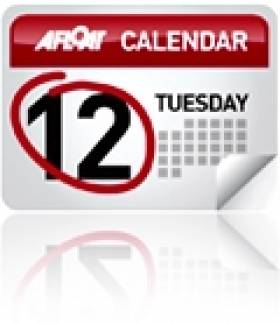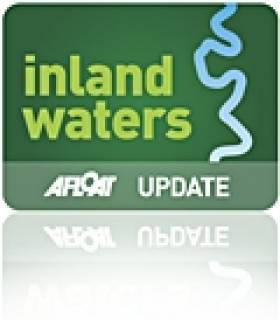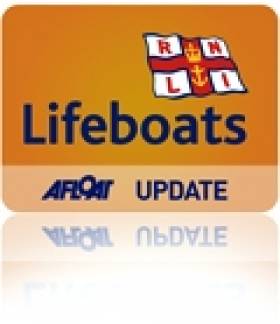Displaying items by tag: pleasure craft
Those participating are asked to assemble at the Hibernia Inn (near Bray Dart Station) from 13.00 hours. At 14.00 hours, an anchor shaped wreath will lead the procession of wreaths to the north Bray pier-head where a memorial service will be held, at which representatives of those in attendance will be invited to speak.
This will be followed by one minute's silence after which, those accompanying the wreaths will embark on the flotilla to a position approximately five-cables due east of Bray Harbour.
Anyone who would like to assist in the preparations and to remember those who have been lost are invited to attend. For further information, contact Tony O'Grady, Captain, (retired) on behalf of "Mariners with Memories" on Tel: (01) 276 0575 Mob: 087 245 4071 Email: [email protected] in addition to this LINK.
Sailing Body Responds to Draft Waterways Bye-Laws
The Irish Sailing Association (ISA) says it sees no value registering small craft that launch from clubs and training centres on inland waterways. The sailing body comments come as part of a Public Consultation programme on proposed new Bye-laws for all seven Irish waterways. Waterways Ireland has commenced the first Phase of a review of bye-laws under its remit. Bye-laws facilitate the management of a waterway, clearly outlining the roles and responsibility of Waterways Ireland and all the people involved in using the navigation, whether for recreational or commercial purposes. The association says the new bye laws alos place an added administrative burden on volunteers when organising events. "The requirement to apply for permission to run every event on a weekly basis will create significant administrative workloads on already over burdened volunteers", it said. The full ISA submission is below:
General Observations
1. Definition of Craft Types
There are no fewer then 14 definitions describing different craft types referred to in the bye- laws. Many of the definitions do not adequately describe the type of craft they are referring to, and have definitions within definitions. It difficult to understand which byelaws are referring to which type of craft – this will lead to confusion and as a result non compliance.
For example: a. 'Pleasure Craft' includes personal watercraft and fast power craft'. Pleasure Craft would imply a craft used for pleasure purposes, and there are already definitions for personal watercraft and fast power craft described – so why duplicate?
b. 'Vessel' means every description of craft including non-displacement craft and sea planes but does not include a boat or personal water craft' A non displacement craft is included under the definition of 'craft' so why mention it? You also need to look up the definition for a 'boat' and 'personal watercraft' before you understand which types of craft are being referred to as a 'vessel'.
2. Insurance
We are fully behind the principal that every craft should have suitable insurance. However we believe this is a matter for the users, owners and organisations. We can see no good reason why Waterways Ireland need to be sent policies in 'original certificate form'. This puts the responsibility and hence the liability of adequate insurance onto Waterways Ireland and will require a significant bureaucratic overhead. It could easily be made an offence not to have insurance and leave it at that.
3. Duplication of Existing Legislation
Much of the content of the draft byelaws proposed is already covered under existing legislation. (eg the wearing of personal floatation devices, age limits for driving powered craft etc.). Duplication of this legislation within the bye laws will do nothing to encourage compliance, and will mean a revision of the byelaws every time there is a change in legislation.
4. Over Regulation/confusion
The draft byelaws as presented contain 32 pages of 'small print' regulations. Some of the terminology and definition used is legalistic and confusing. It will be a very difficult task to educate the waterways users as to their responsibilities towards the byelaws, and an even bigger task to enforce them.
There has been no mention of a plan for implementing the byelaws, and we would have concerns that Waterways Ireland do not have a plan or adequate resource to communicate sufficiently the detail of the byelaws, or to enforce compliance.
5. Safety
It has been shown time and time again that regulation used to manage activity on the water does little or nothing to improve safety standards unless there is sufficient resource to enforce it. The attempt within the bye laws to incorporate a 'one size fits all' set of regulations to manage activities on the waterways is inappropriate, unnecessary and will be impossible to enforce. As such it will lead to confusion and non compliance.
There are some 'bottle neck' areas of congestion, where more stringent control measures may be necessary in order to encourage responsible participation and enjoyment. We recommend a different set of regulations be developed for known trouble spots, leaving the majority of the waterways relatively unrestricted.
6. Link with existing Local Authority byelaws
In recent years, Local Authorities around the country have developed byelaws of their own to manage access to and activity on the waterways, harbours and beaches under their jurisdiction.
We are concerned that there appears to have been little consultation or coordination with local authorities who already have byelaws established, particularly counties which boarder Waterways Ireland navigation. This could potentially lead to one set of regulations applying whilst launching your craft from a local authority controlled slipway, whilst another set of regulations applying once under way on the water.
We strongly urge waterways Ireland to liaise with local authorities to ensure their byelaws are consistent with those already established.
Feedback on Specific Byelaws
(6) Registration The proposal set out in bye-law 6 needs a total revision.
a. Compulsory Registration
The ISA is not opposed to the principle of registration of vessels provided it is equitable, has a purpose (other than taxation) and is required only where necessary. Otherwise there will be a strong disincentive to register, and the cost of tracking down and seeking to make vessel owners compliant will exceed any possible benefit.
We do not see any value in the need for registering small craft that launch from clubs and training centres, which are under the control of and/or are participating in an organised activity.
b. ValidityPeriod
Where registration is required it is not sufficient to make it valid for a period to be decided by the Chief executive. A validity period should be clearly identified (5 years would seem appropriate) and communicated to all the keepers of registered craft.
c. Cost
Registration should not be seen as a revenue generator for Waterways Ireland. It should be administered at cost and fees set as such. Again this should not be at the whim of the Chief Executive.
d. Lettering
The proposal for all craft wishing to display their own print of the registration number to have 300mm high numbers (7)(b) port and starboard on the bow, and on the stern is completely ill-conceived. There is an assumption that the number issued by Waterways Ireland (7)(a) is the same size? For smaller craft it is simply not possible, and for larger craft will meet with huge opposition if it is implemented.
e. Insurance
We are fully behind the principal that every craft should have suitable insurance. This is a matter for the users and owners and we can see no good reason why WI need to
be sent this in 'original certificate form'. By checking an insurance policy Waterways Ireland is taking responsibility for ensuring all craft registered have adequate cover for any incident that they are involved with on the waterways. It could easily be made an offence not to have adequate insurance (putting the responsibility on the registered keeper) and leave it at that.
f. Visiting Craft
There are a number of craft that use the waterways occasionally when visiting the area. They are unlikely to have prior knowledge of the byelaws and often will not be in a position to apply for registration three weeks in advance. This will significantly restrict access, and/or encourage non compliance. Temporary visitors will need to be catered for.
g. On-LineRegistration
Waterways Ireland are proudly declaring the development of a 'computerised registration package', yet all registration applications must be submitted by hard copy 'snail mail'. This is not the modern way to do business.
h. Duplication of Registers
The ISA currently operates a Small Craft Register which is available on line and may be used to identify all types of craft. It may be has a five year validity and costs €15. We have the ability to process applications in a day. This is already being used by many local authorities that require permits to launch craft. We would welcome the opportunity to discuss the potential for combining the registers in order to help simplify registration system for the user.
(20) Zoning The ISA would ask Waterways Ireland to consult with us prior to implementing zoning, so we may help to ensure that congested areas are managed in a pro active way to encourage responsible participation, and will not cause confusion and/or unnecessarily restrict activity.
a. Restriction of Craft
Whilst we have no difficulty in 'Zoning' areas in order to pro actively manage use of the waterways in congested areas, it should be stressed that zoning may be required in congested areas in order to 'promote' responsible participation in activities. The current terminology used in the byelaws; 'restrict or prohibit craft from taking part' does not suggest Waterways Ireland is actively looking to promote activities on the waterways.
b. Consistent Markings
The ISA has been working with local authorities on implementing pro active management strategies for the management of beaches and harbours within their jurisdiction. The signage and buoyage for zoned areas need to be consistent with those used by local authorities and we would request that waterways Ireland consult with us prior to developing the infrastructure and management systems required for zoning.
(21) Commercial Operations
a. Voluntary Organisations
Byelaw 21 outlines the requirement to obtain permission to carry on any trade or business. It also mentions that there will be a charge levied in respect of this permission. There are a number of clubs and associations that organise training,
recreational and competitive events for which a charge is levied to the participants. This is not commercial activity, as the charge is to cover the costs of organising the said activity.
We believe it is not the intention of waterways Ireland that these clubs and associations will be charged for organising their activities, however this needs to be clarified.
b. Commercial Operators
The ISA has a number of accredited sailing schools and clubs that operate on the inland waterways. These organisations attract visitors and tourism to the area, whilst at the same time improving safety standards on the waterways.
There should be no charge levied for approved training activity that is carried out by an organisation that is accredited by a national authority and/or has been approved by Waterways Ireland.
(8) Owners, Masters and Crew of Craft
Paragraph (8). Carrying an anchor. It is not general practice in racing yachts to have an anchor stowed in such a position as 'to enable them to be dropped or weighed quickly'. This may incur a €150 fine depending on the interpretation of 'quickly'. This paragraph needs rethinking.
(25) Placing of objects
Clubs and training centres use temporary buoys to mark race courses, training areas etc. It is not reasonable to expect these organisations to apply for permission in writing every time they are involved in organised activity afloat.
(28) Miscellaneous Prohibitions
We note that there does not seem to be any prohibition on the causing of a nuisance for example by noise of engine, generator etc. in a public harbour to other users or any particular restriction on causing such annoyance. We believe such a prohibition should exist.
(32) Events If established organisations are forced to apply for permission for every event they organise their activities will not be sustainable.
a. Notification and Permission
An 'Event' is described as a 'regatta, race or any organised gathering of craft or people for the purpose of competition or display'.
Events in ISA organisations take place on a weekly and sometimes daily basis. They are often weather dependent and organised at short notice. It is unreasonable to expect clubs and associations to apply for permission organise every event, as this will severely restrict their ability to operate.
b. Insurance
ISA Clubs and Associations are fully aware of their responsibilities towards their liability for the organising of events, and carry insurance to cover all of their activities.
Should Waterways Ireland insist on receiving proof of insurance the liability may well be passed on to Waterways Ireland in the event the cover proves to be insufficient.
We recommend that paragraph 32. (6) (b) be removed.
c. Administration
ISA organisations are in the main run by volunteers. The requirement to apply for permission to run every event on a weekly basis will create significant administrative workloads on already over burdened volunteers.
We believe the intent of this bye law was not to restrict the activities of established clubs that organise regular events, and we recommend that for established clubs, training centres and associations affiliated to a recognised authority, a prior agreement be made between Waterways Ireland and the organisation concerned, to allow for the organising of events within agreed parameters without the need to apply for permission.
Sailor Rescued from Burning Boat off Cork Coast
Youghal and Ballycotton lifeboat stations responded to the call and Ballycotton lifeboat station spoke of how they could see the black smoke in the distance as they rushed to the lifeboat station. An angling boat in the vicinity recovered the lone sailor from the sea. He was transferred to another angling boat and was immediately taken to Youghal where his condition was assessed by medical personnel.
Youghal and Ballycotton lifeboats were requested by the Coastguard to remain on scene while the pleasure craft blazed. Approximately an hour later the boat sank and the lifeboats returned to station.
Related Safety posts
RNLI Lifeboats in Ireland
Safety News
Rescue News from RNLI Lifeboats in Ireland
Coast Guard News from Ireland
Water Safety News from Ireland
Marine Casualty Investigation Board News
Marine Warnings


























































